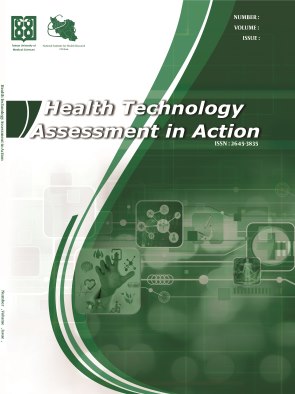Perception of Medical Professionals on Integration of Artificial Intelligence in Healthcare Practices- An Exploratory Study
Perspectives of medical professionals on integration of AI in healthcare systems
Abstract
Background: The application of artificial intelligence (AI) in the field of healthcare has paved the way for improved diagnostic accuracy, personalized treatment regimens, and overall enhancement in patient outcomes. The AI-related technologies are increasingly being applied in the healthcare sector, with the potential to bring about significant transformations in patient care and routine administrative operations, linking patients, providers, and society at large.
Objectives: The current article seeks to explore the perceptions of Indian doctors and nurses regarding the implementation of AI in their respective work areas.
Methods: Focused group discussions (FGDs) and individual in-depth interviews (IDIs) were conducted separately with the target respondents (doctors: FGD: n = 13, IDI: n = 9; nurses: FGD: n = 25, IDI: n = 16) to identify their perspectives and real-time experiences regarding AI integration in everyday workplace practices. The study design is qualitative in nature, with open-ended questions asked to the target respondents. Purposive sampling was used to recruit participants for the study.
Results: Two main themes and seven subthemes were identified. The findings suggest that while AI certainly demonstrates potential for enhancing healthcare services, it is important to carefully consider its possible impact on healthcare workforce motivation, patient care, perceptions of patients, and the need to redesign existing healthcare practices.
Conclusions: Artificial intelligence has significant scope and application in the healthcare industry. Indian healthcare professionals, including doctors and nurses, perceive that intelligent automation can effectively enhance the management of repetitive workflows. However, a section of respondents also expressed concern about potential job losses due to AI integration.
Healthc J. 2021;8(2):e188-e94. [PubMed ID:34286183]. [PubMed Central ID:PMC8285156]. https://doi.org/10.7861/fhj.2021-0095.
2. Scott RE, Mars M. Principles and framework for eHealth strategy development. J Med Internet Res. 2013;15(7):e155. [PubMed ID:23900066]. [PubMed Central ID:PMC3742409]. https://doi. org/10.2196/jmir.2250.
3. Massalha S, Clarkin O, Thornhill R, Wells G, Chow BJW. Decision Support Tools, Systems, and Artificial Intelligence in Cardiac Imaging. Can J Cardiol. 2018;34(7):827-38. [PubMed ID:29960612]. https://doi.org/10.1016/j.cjca.2018.04.032.
4. He J, Baxter SL, Xu J, Xu J, Zhou X, Zhang K. The practical implementation of artificial intelligence technologies in medicine. Nat Med. 2019;25(1):30-6. [PubMed ID:30617336]. [PubMed Central ID:PMC6995276]. https://doi.org/10.1038/s41591-018-0307-0.
5. Bini SA. Artificial Intelligence, Machine Learning, Deep Learning, and Cognitive Computing: What Do These Terms Mean and How Will They Impact Health Care? J Arthroplasty. 2018;33(8):2358-61. [PubMed ID:29656964]. https://doi.org/10.1016/j.arth.2018.02.067.
6. Liu X, Faes L, Kale AU, Wagner SK, Fu DJ, Bruynseels A, et al. A comparison of deep learning performance against healthcare professionals in detecting diseases from medical imaging: a systematic review and meta-analysis. Lancet Digit Health. 2019;1(6):e271-e97. [PubMed ID:33323251]. https://doi.org/10.1016/S2589-7500(19)30123-2.
7. Alami H, Lehoux P, Auclair Y, de Guise M, Gagnon MP, Shaw J, et al. Artificial Intelligence and Health Technology Assessment: Anticipating a New Level of Complexity. J Med Internet Res. 2020;22(7):e17707. [PubMed ID:32406850]. [PubMed Central ID:PMC7380986]. https://doi.org/10.2196/17707.
8. Das SK, Dasgupta RK, Roy SD, Shil D. AI in Indian healthcare: From roadmap to reality. Intelligent Pharmacy. 2024;2(3):329-34. https://doi.org/https://doi.org/10.1016/j.ipha.2024.02.005.
9. Basu K, Sinha R, Ong A, Basu T. Artificial Intelligence: How is It Changing Medical Sciences and Its Future? Indian J Dermatol. 2020;65(5):365-70. [PubMed ID:33165420]. [PubMed Central ID:PMC7640807]. https://doi.org/10.4103/ijd.IJD_421_20.
10. Sommer D, Schmidbauer L, Wahl F. Nurses’ perceptions, experience and knowledge regarding artificial intelligence: results from a cross-sectional online survey in Germany. BMC Nurs. 2024;23(1):205. [PubMed ID:38539169]. [PubMed Central ID:PMC10967047]. https://doi.org/10.1186/s12912-024-01884-2.
11. Sengupta M, Roy A, Ganguly A, Baishya K, Chakrabarti S, Mukhopadhyay I. Challenges Encountered by Healthcare Providers in COVID-19 Times: An Exploratory Study. J Health Management. 2021;23(2):339-56. https://doi.org/10.1177/09720634211011695.
12. World Medical Association. World Medical Association Declaration of Helsinki: ethical principles for medical research
involving human subjects. JAMA. 2013;310(20):2191-4. [PubMed ID:24141714]. https://doi.org/10.1001/jama.2013.281053.
13. Clarke V, Braun V. Thematic analysis. J Positive Psychol. 2016;12(3):297-8. https://doi.org/10.1080/17439760.2016.1262613.
14. Alowais SA, Alghamdi SS, Alsuhebany N, Alqahtani T, Alshaya AI, Almohareb SN, et al. Revolutionizing healthcare: the
role of artificial intelligence in clinical practice. BMC Med Educ. 2023;23(1):689. [PubMed ID:37740191]. [PubMed Central ID:PMC10517477]. https://doi.org/10.1186/s12909-023-04698-z.
15. Serbaya SH, Khan AA, Surbaya SH, Alzahrani SM. Knowledge, Attitude and Practice Toward Artificial Intelligence Among Healthcare Workers in Private Polyclinics in Jeddah, Saudi Arabia. Adv Med Educ Pract. 2024;15:269-80. [PubMed ID:38596622]. [PubMed Central ID:PMC11001543]. https://doi.org/10.2147/AMEP.S448422.
16. Hamedani Z, Moradi M, Kalroozi F, Manafi Anari A, Jalalifar E, Ansari A, et al. Evaluation of acceptance, attitude, and knowledge towards artificial intelligence and its application from the point of view of physicians and nurses: A provincial survey study in Iran: A cross-sectional descriptive-analytical study. Health Sci Rep. 2023;6(9):e1543. [PubMed ID:37674620]. [PubMed Central ID:PMC10477406]. https://doi.org/10.1002/hsr2.1543.
17. Secinaro S, Calandra D, Secinaro A, Muthurangu V, Biancone P. The role of artificial intelligence in healthcare: a structured literature review. BMC Med Inform Decis Mak. 2021;21(1):125. [PubMed ID:33836752]. [PubMed Central ID:PMC8035061]. https://doi.org/10.1186/s12911-021-01488-9.
18. Baowaly MK, Lin CC, Liu CL, Chen KT. Synthesizing electronic health records using improved generative adversarial networks. J Am Med Inform Assoc. 2019;26(3):228-41. [PubMed ID:30535151]. [PubMed Central ID:PMC7647178]. https://doi.org/10.1093/jamia/ocy142.
| Files | ||
| Issue | Vol 9 No 2 (2025) | |
| Section | Articles | |
| DOI | https://doi.org/10.18502/htaa.v9i2.18720 | |
| Keywords | ||
| Perception Artificial intelligence healthcare India | ||
| Rights and permissions | |

|
This work is licensed under a Creative Commons Attribution-NonCommercial 4.0 International License. |




